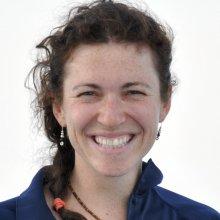
Gabrielle Inglis
Tell us about your work/ research. What kinds of things do you do?
I specialize in oceanographic instrumentation. When I am sailing with the US Antarctic Program, you can find me in any one of the laboratories or on the deck operating and fixing all kinds of equipment that scientists use to explore the Southern Ocean. Before that, I was in graduate school where I specialized in mapping the sea floor by taking pictures and acoustic data using ROVs. We would turn these images into 3D models of shipwrecks, hydrothermal vents, and other interesting seafloor features.
What sparked your initial interest in your career?
It's pretty hard to pinpoint the initial spark that started my career. Since I was really young, I have found myself drawn to exploring as much of the natural world as possible, and I have been following that drive ever since. I like supporting science missions because I can observe and explore and be part of meaningful efforts to protect the natural world as well.
Who influenced you or encouraged you the most?
My dad has been my greatest influence. He encouraged me, even as a very young child, to take everything apart, learn how it worked and ask a lot of questions. As I got older, he encouraged me to just go for it anytime something interested me. He never accepted a lack of confidence or experience as a reason to not try something. As a result, I have ended up doing work I love with people who inspire me in some of the most gorgeous places in the world.
What element of your work/ study do you think is the most fascinating?
I love taking broken equipment apart, figuring out what's wrong and redeploying it. It's always frustrating, challenging and rewarding puzzle. Oh, and watching wildlife! The wildlife I get to see in the ocean is jaw-dropping.
How did you get involved with the Nautilus Exploration Program?
I was a graduate student in the research lab that supports mapping operations on the Nautilus (University of Rhode Island's research group of Dr. Chris Roman) so I have been working with OET since 2007.
What other jobs led you to your current career?
The various jobs that led me to my career now are a wind energy consultant, a wilderness canoe trip guide, and a graduate student studying underwater mapping techniques. I spent many years as an Electronics Technician for the US Antarctic Program helping support research at the very edge of the planet.
What are your degrees and certifications?
My degrees are Bachelor of Science in Geography - Dartmouth College; Masters of Science in Ocean Engineering - University of Rhode Island 2010; Ph.D. in Ocean Engineering - University of Rhode Island 2013.
What are your hobbies?
I mountain bike, kiteboard, and ski. I also recently started knitting a lot; it makes the long commute to Antarctica go by more quickly.
What advice would you give someone who wants to have a career like yours?
I think the most important thing I found for someone who is interested in a career like mine was that you should never doubt your own abilities. There is nothing you can't learn if you put the time and heart into it (seriously). So if something seems inspiring to you, you should go for it. And don't be afraid to ask potential mentors for help. Good mentors love to share what they do with enthusiastic and hardworking people.
Expeditions
Gabrielle participated in the following Ocean Exploration Trust expeditions:
